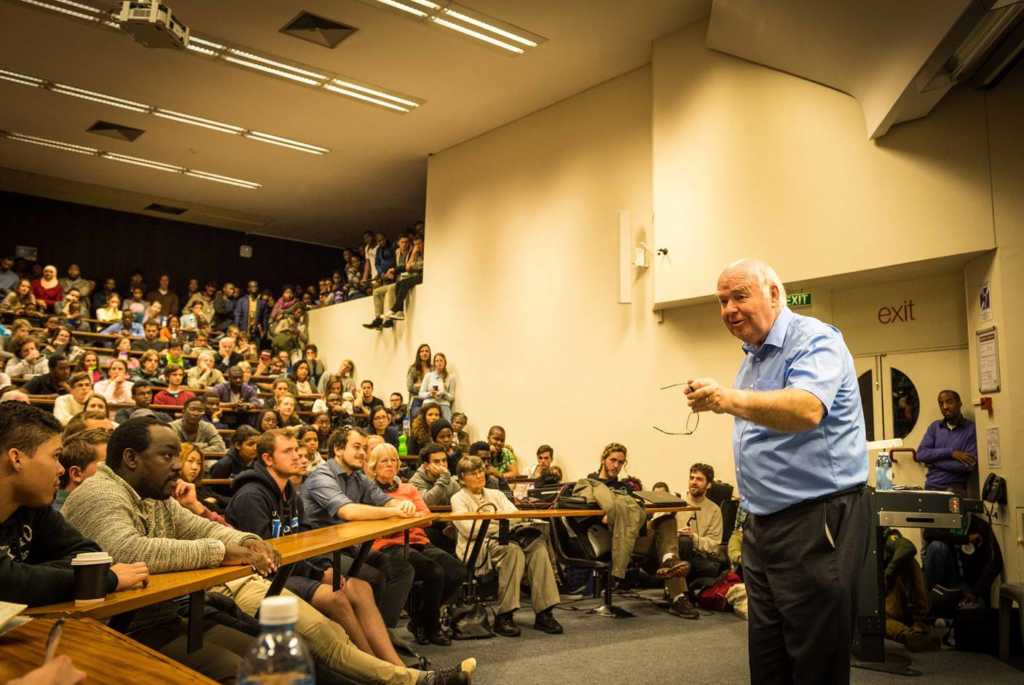John Carson Lennox is an esteemed professor emeritus of mathematics at Oxford University. He is also a world-renowned scientist and, most importantly, a Christian.
Throughout his distinguished academic career, Lennox has been in the debating ring with leading atheists such as Richard Dawkins and the late Christopher Hitchens — indeed, he is the only man on the planet to have comfortably “beaten” both in the debate arena.
He has a fierce intellect, loves Jesus with a passion and is not afraid of tackling the biggest questions of life itself.
In an event hosted by apologetics ministry organization Ravi Zacharias International Ministries, Prof. Lennox addressed some intriguing questions surrounding the value of the scientific method and whether or not we can attain an evidence-based faith in Christ.
Arriving at Cambridge University as an undergraduate and having grown up in a Christian home, a young John Lennox said he possessed both “faith in God,” and “faith in the scientific method” — something that confused many of his peers.
“One of the confusions these days it that “faith” is a religious word which means believing when there’s no evidence. But it isn’t,” Lennox explained. “It’s an ordinary word which means “trust,” which comes from the Latin, ‘fides.'”
The early definition of science does explain everything
“Originally, the answer to the question is very simple: by definition, science explains everything,” Lennox noted. “Because it is rational, it means ‘to give a rational account of, and therefore to gain knowledge.'”
However, with time, the definition of science has shifted, and has commanded some philosophical ground — “science now means ‘the natural sciences,'” Lennox added. “These days, the idea that is common in academia is that natural sciences are the only way to truth. Philosophically, we call that ‘scientism.'”
Indeed, at this point, belief in science attempts to thwart rational belief in God — a conflict that Lennox believes should not exist if we are to view science in its proper form.
There is no conflict between science and God
“This idea that there is a conflict between science and God cannot be true,” Lennox declared. “Why? Because if you go the very top of science, Nobel prize level, there are scientists on both sides.”
“Let’s take physics. Take Higgs, who won the Nobel Prize for the Higgs Boson — a brilliant physicist and an atheist,” Lennox said. “But William Phillips, a low-temperature physicist, who won the same prize, he’s a Christian!”
So, “there is a conflict — but it’s not between science and God,” Lennox explained, “it’s between theism and atheism — the two worldviews.”
‘Can you prove God to me?’
As a leading professor in his scientific field, Lennox said that he is often met with the demanding and weighty question: “can you prove the existence of God to me?”
“I say, in what sense do you mean proof? If you mean proof in the rigorous mathematical sense, that only works within mathematics.. it doesn’t work in physics, chemistry or anywhere else,” Lennox explained.
“When we use the word “proof” [in terms of God’s existence] we mean it in the sense in which lawyers mean it — evidence, pointers, indicators that are beyond reasonable doubt,” the professor noted.
Of course, the natural response from the atheists is that this type of evidence is not extensive enough.
Would that be fair?
“No,” says Lennox, because “trust and faith is not only in propositions, it is also in people.”
Giving a real-life example, Prof. Lennox said: I’ve been married to the same woman for 50 years. I believe she loves me, I couldn’t prove it to you mathematically — but I’d risk my life on it!”
With that being said, Lennox qualified that “evidence is a hugely important thing,” when it comes to personal faith.
Indeed, even those who are not Christian would understand that blind faith in things or people is foolish and ill-informed.
“Why do I believe my wife loves me? Because I believe there is strong evidence for it,” Lennox explained. “All of us are familiar with evidence-based faith. You’re crazy if you believe things without evidence or trust people without evidence.”
“When it comes to my Christian faith, I adopt exactly the same criteria — why do I believe it? Because I believe there is powerful evidence.”
What does the Bible say about evidence-based faith?
“It’s always sensible to listen to what people say if you want to know what they believe,” Lennox quipped, urging Christians to examine the Bible in order to discover what our faith in Jesus should be based upon. “It will tell you directly,” the Professor added.
Indeed, the purpose of the gospel of John is to define faith on the basis of evidence, Lennox argued, citing John 20:31: “these things are written that you may believe that Jesus is the Messiah, the Son of God, and that by believing you may have life in his name.”
“In other words, John is saying ‘these things that I’ve collected and written down — they are to form the basis of belief, that is they are evidence!” Lennox explained.
“When Christianity was launched on the world, it was launched on the world by people from a very unexpected background who started to say that they had evidence of meeting Jesus Christ risen from the dead.”
“So,” Lennox continued, “my Christian faith is based on evidence and my scientific faith is equally based on evidence.”
“Both are rational disciplines.”



